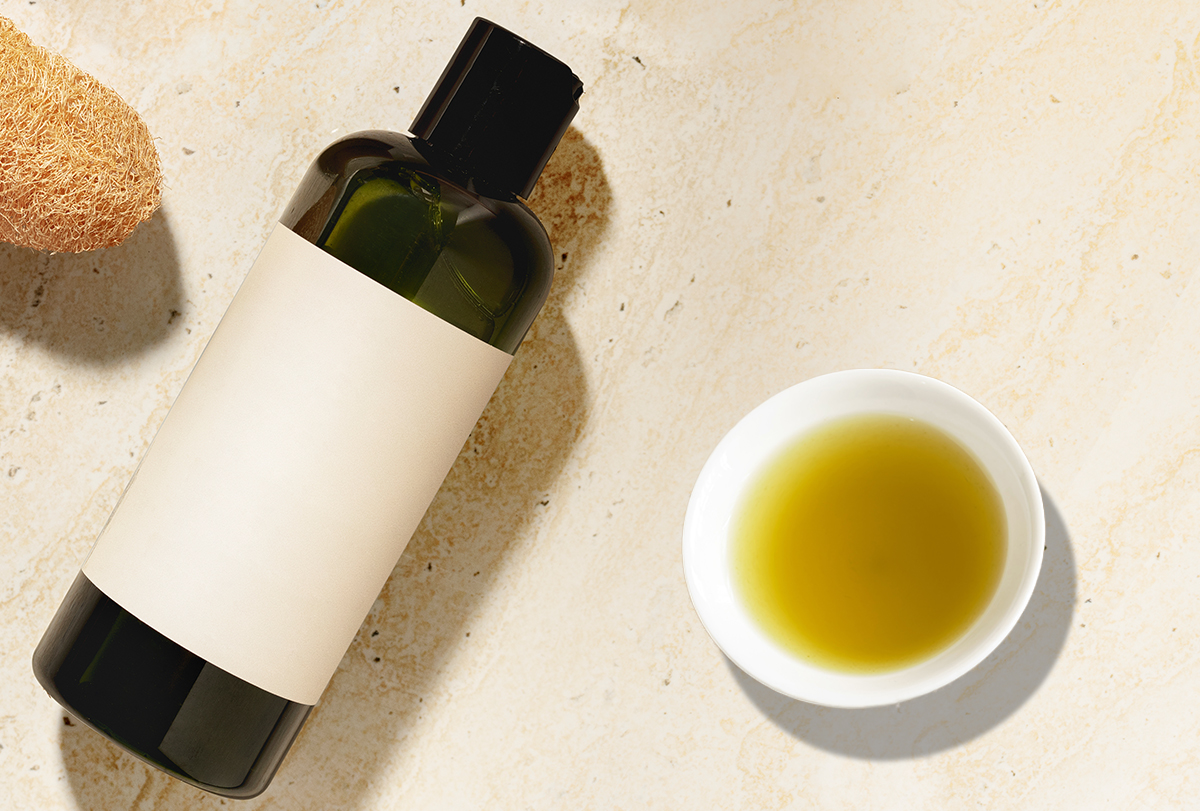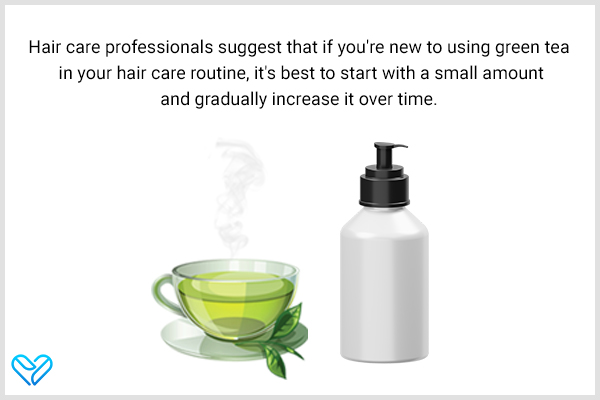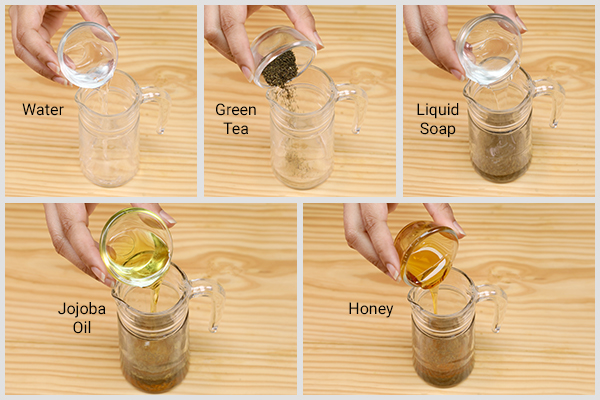In this article:
Yes, adding green tea to your shampoo can be advantageous for your hair.

Although it may seem a little strange, there are numerous benefits of including green tea in your hair care routine, and to reap these benefits, you can mix green tea in your shampoo and conditioner.
If you do not wish to do that, you can also make a green tea hair mask or simply drink green tea twice a day every day.
Green tea is packed with chemical compounds such as polyphenols that promote healthy hair growth and prevent hair loss. Research has shown that green tea can improve the overall health of your hair by reducing hair loss and supporting hair growth. (1)
So, why not attempt this remedy and see the amazing results for yourself?
Benefits of Mixing Green Tea With Shampoo
Here’s why mixing green tea in your shampoo is a tea-rrific idea for your hair!
1. Facilitates hair growth
Green tea has been a popular choice for hair because it has the potential to support hair growth. Research indicates that green tea contains polyphenolic compounds that can stimulate hair growth and discourage hair loss.
In one study, mice that were given a 50% portion of dehydrated green tea extract in their drinking water for 6 months exhibited substantial hair regrowth on the head, neck, and other regions. (2) On the other hand, no hair growth was seen among the mice that were fed normal water.
While more investigation is required to completely comprehend the effects of green tea on hair growth in humans, this study provides promising evidence of its possible benefits. (1)(2)
2. Reduces greasiness
If you have greasy hair, green tea might just be what you need!
A study found that green tea can be an effective ingredient in hair tonics for reducing scalp sebum, which is responsible for making hair greasy.
The results of the study showed that the green tea hair tonic significantly reduced scalp sebum for up to 28 days after application. This result indicated that green tea can be a safe and efficient topical therapy for reducing scalp greasiness. (3)
Overall, incorporating green tea into your hair care routine can be a natural and effective way to prevent greasy hair. (3)
3. Improves the scalp condition and hair fullness
Green tea is rich in polyphenols, which are antioxidants that can help prevent the buildup of harmful substances called free radicals in the body. These free radicals are responsible for many diseases and can accelerate the aging cycle.
According to research, topical use of antioxidants, such as those in green tea, can be good for the hair.
A study found that using antioxidant-rich products can improve the condition of the scalp, which can reduce hair shedding and can make the hair appear fuller.
In other words, taking care of your scalp with antioxidant-rich products can help in keeping your hair healthy and discourage hair thinning. (4)(5)
How Much Green Tea to Add to Shampoo

The quantity of green tea you mix with your shampoo relies on your hair type, hair thickness, and preferences.
Generally, it’s recommended to make a strong cup of green tea and let it cool down to room temperature. Then, mix it with your regular shampoo in a 1:1 ratio, or add a bit more green tea if you have thick or long hair.
Thus, the perfect amount of green tea to mix with your shampoo to reap its hair benefits depends on your personal preference.
Hair care professionals suggest that if you’re new to using green tea in your hair care routine, it’s best to start with a small amount and gradually increase it over time.
You can also adjust the frequency of use and see what works best for you. Some people prefer to use green tea shampoo once a week, while others use it every time they wash their hair.
Overall, adding green tea to your shampoo can be a great way to improve the health and appearance of your hair, but it’s important to find the right balance that works for you.
Green Tea With Shampoo: How to Prepare and Use
- Make a cup of green tea.
- Let the tea get to room temperature. You can speed up the cooling process by putting the tea in the fridge for a few minutes.
- Put your everyday shampoo into a bowl.
- Add the green tea to the shampoo in a 1:1 ratio (you can also make adjustments to the ratio depending on your preference). Mix the green tea and shampoo well.
- Use the green tea shampoo mixture to wash your hair as you usually would. Massage the mix on your hair and scalp.
- Wash it off with water.
How to Make Green Tea Shampoo at Home

You would be surprised to know that you can make your own green tea shampoo at home all on your own. Here’s how to do it:
- Boil 1 cup of water and put in a handful of green tea leaves.
- After half an hour of steeping, strain the tea to remove the residual leaves.
- Add 1 tablespoon liquid soap, 1 tbsp of oil (coconut or jojoba oil), and 1 tbsp of honey to the green tea water. Mix all of them very well in a bowl.
- Store the shampoo in a bottle and use it as you normally would.
Which Is Better for the Hair: Drinking Green Tea or Applying It Topically?
In general, both drinking green tea and using green tea topically can be beneficial for hair health. So, choosing one is solely based on personal preference.
However, applying it to your scalp may be more helpful as it allows more direct contact with the hair and the scalp. Other advantages of topical green tea application include ameliorating inflammation and stimulating hair growth. (6)(7)
On the other hand, drinking green tea can deliver a wide spectrum of advantages for the entire body, and not just the hair. The antioxidants in green tea can aid in decreasing inflammatory responses and oxidative stress in the body, which can contribute to healthy hair growth. (4)(5)
Green tea also has some amount of caffeine, which can also promote hair health. (8) The caffeine in green tea may also help support blood flow to the scalp, which can facilitate hair growth and prevent hair loss.
Most-Asked Questions
Can using green tea damage the hair?
When used properly, green tea is unlikely to cause any damage to the hair.
Not much research has been conducted to study the side effects of green tea on hair, but some people may experience mild irritation or sensitivity when using green tea, particularly if they have sensitive skin or scalp.
It’s also crucial to select high-quality green tea products that do not have harsh chemicals and additives that may be harmful to hair health.
How long should I leave green tea in my hair?
As a rule of thumb, most green tea hair treatments should be left on the hair for 30 minutes to an hour before rinsing it off.
How frequently should I mix green tea with my shampoo?
In general, it’s recommended to use green tea with your shampoo once or twice a week to start, and then adjust as needed based on the results.
Can green tea darken my hair?
Green tea has been known to darken hair over time, particularly if it is left on the hair for an extended period. This effect is generally more noticeable in lighter hair colors, such as blonde or gray hair. (9)
Final Word
Mixing green tea with shampoo is beneficial for hair health as green tea contains polyphenolic compounds that can improve hair growth, prevent hair loss, and reduce excessive scalp sebum.
Using green tea in hair care can also improve the condition of the scalp, prevent hair shedding, and make the hair appear fuller. The amount of green tea to be mixed with shampoo should be a very little amount at first and then slowly increased over time.
- Was this article helpful?
- YES, THANKS!NOT REALLY


